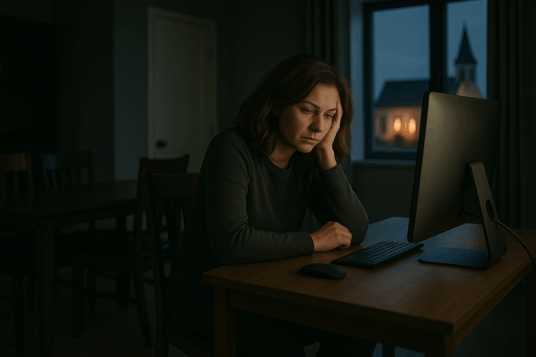One of the most ignored factors in the mental health crisis is also one of the most foundational: the human connection. Not superficial interaction. Not digital mimicry. Real, consistent, and trustworthy connection. We need embodied Christianity.
Modern society has tried to redefine what it means to be human. It insists that you are primarily an individual—an autonomous unit of desires and rights. It cuts you off from history, family, tradition, religion, and even your own biology, telling you to invent your identity as you go. Then it acts surprised when that leaves people anxious, fragile, and mentally unstable.
Many today are living with deep emotional and relational wounds that were never addressed, only buried. We now know that early relational trauma—neglect, emotional inconsistency, abandonment, abuse—leaves marks not just on memory but on our soul. It affects the body and brain to expect disconnection, rejection, and fear. This is the foundation for what many call anxiety and depression. But these aren’t simply disorders of the mind; they are reflections of disordered relationships.
God designed children to thrive in stable, loving relationships with those who reflect His care. A securely attached child learns, “I am safe. I am wanted. I am not alone.” A neglected or abused child learns the opposite. “I have to protect myself. I can’t trust anyone. I am a burden. I am alone.” Those beliefs don’t fade with age. They harden. And they carry forward into how people handle friendship, marriage, leadership, the Church, and even God Himself.
On top of these early wounds, our culture adds fuel to the fire by encouraging isolated individualism as a way of life. We move away from family. We idolize personal freedom over commitment to others. The internet offers the illusion of community without the demands of it. It is now possible to go months or years without engaging in a single real and raw conversation, having a shared meal around a real table with real people who really care about you.
This is where I must speak plainly to those who have settled for “doing church online.” Unless you physically can’t gather with others in person, this is not what church was meant to be. Church is not a broadcast stream. It’s not just a message or a worship set. It is the people of God, meeting face to face, hearing each other pray, carrying each other’s burdens, and remembering Christ through the bread and cup together.
When communion and community really matter, we remove barriers to make them possible. If someone is homebound, the church should find a way to bring the church to them. But for the many who can go but won’t, something has gone wrong. Yes, the pandemic disrupted lives and instilled new fears. But it is no longer 2020. If fear or habit is keeping you in front of a screen rather than present with God’s people, then it is time to take courage, break free, and come home.
Even in crowded cities, many are deeply alone. People don’t feel seen, safe, or supported. And isolation is not a neutral condition—it changes how the brain works. It warps your perception of reality and how you relate to others. And it keeps your body in a state of tension.
Churches can and must provide a place for real interaction, where the lonely can go to find friends and a supportive network. Where those dealing with mental struggles can find peace, love, and truth—not just in words, but in community.
But let’s be honest. Many churches today are not functioning as spiritual families. Instead, they prioritize performance and attendance over relationship and formation. People come in with years of emotional damage and leave the same way—unnoticed, unchallenged, untouched. This is a failure not of theology but of practice. A failure to obey the command to “bear one another’s burdens” (Galatians 6:2), “encourage one another daily” (Hebrews 3:13), and “not neglect meeting together” (Hebrews 10:25).
The early Church didn’t heal people with inspirational talks or therapeutic language. It healed them with presence. With shared food. With prayer. With regular contact. “They devoted themselves… to the fellowship” (Acts 2:42).
God never made us to be alone. He made us for communion with Him and with one another. And the answer isn’t more screen time. The answer is the hard, healing work of reattachment: to people of truth and love, and to the God who draws us all, including the brokenhearted.
